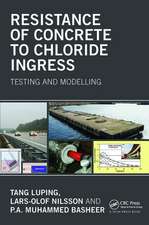Structural Design from First Principles
Autor Michael Byfielden Limba Engleză Paperback – 6 feb 2018
This text presents good approximate solutions to complex design problems, such as "Wembley-Arch" type structures, the design of thin-walled structures, and long-span box girder bridges. Other more code-based textbooks concentrate on relatively simple member design, and avoid some of the most interesting design problems because code compliant solutions are complex. Yet these problems can be addressed by relatively manageable techniques. The methods outlined here enable quick, early stage, "ball-park" design solutions to be considered, and are also useful for checking finite element analysis solutions to complex problems.
The conventions used in the book are in accordance with the Eurocodes, especially where they provide convenient solutions that can be easily understood by students. Many of the topics, such as composite beam design, are straight applications of Eurocodes, but with the underlying theory fully explained.
The techniques are illustrated through a series of worked examples which develop in complexity, with the more advanced questions forming extended exam type questions. A comprehensive range of fully worked tutorial questions are provided at the end of each section for students to practice in preparation for closed book exams.
| Toate formatele și edițiile | Preț | Express |
|---|---|---|
| Paperback (1) | 388.22 lei 3-5 săpt. | +27.88 lei 7-13 zile |
| CRC Press – 6 feb 2018 | 388.22 lei 3-5 săpt. | +27.88 lei 7-13 zile |
| Hardback (1) | 1017.91 lei 6-8 săpt. | |
| CRC Press – 7 feb 2018 | 1017.91 lei 6-8 săpt. |
Preț: 388.22 lei
Nou
Puncte Express: 582
Preț estimativ în valută:
74.28€ • 77.56$ • 61.48£
74.28€ • 77.56$ • 61.48£
Carte disponibilă
Livrare economică 15-29 martie
Livrare express 01-07 martie pentru 37.87 lei
Preluare comenzi: 021 569.72.76
Specificații
ISBN-13: 9781498741217
ISBN-10: 1498741215
Pagini: 335
Ilustrații: 206 Illustrations, black and white
Dimensiuni: 178 x 254 x 18 mm
Greutate: 0.59 kg
Ediția:1
Editura: CRC Press
Colecția CRC Press
ISBN-10: 1498741215
Pagini: 335
Ilustrații: 206 Illustrations, black and white
Dimensiuni: 178 x 254 x 18 mm
Greutate: 0.59 kg
Ediția:1
Editura: CRC Press
Colecția CRC Press
Cuprins
Introduction. Laterally restrained and unrestrained steel beams. Buckling of columns, trusses and arches. Buckling of plate girders and box girders. Steel-concrete composite beams. Reinforced concrete beams. Reinforced concrete subjected to stress concentrations. Mechanics of crack control in concrete. Prestressed concrete. Timber.
Notă biografică
Michael Byfield is a lecturer at the University of Southampton, UK and runs his own engineering consultancy. He was awarded the Parkman Medal by the Institution of Civil Engineers and his research focuses on blast loading of buildings.
Recenzii
If you read this book, absorb its timeless principles and work your way through the examples, you will learn a great deal and it will serve you well in your career.
--Allan Mann, FREng
"The skill of the structural engineer lies in creating possibilities where others see the impossible. This skill requires years of nurture and practice, which is why this book is a must have on any book shelf. It focuses on the embedment of fundamental principles in structural mechanics to design. Read it! Enjoy it! Apply it!"
-- Tim Ibell, University of Cambridge and past-president of the Institution of Structural Engineers
"Mike Byfield has hit on an essential first principle of his own: To make things as simple as possible but no simpler. His illustrations are deceptively minimal, but they demonstrate another engineering first principle….to an engineer, a line is not just a line….it is short-hand, code, for a real structure, responding to mathematics, physics, environment, gravity, people, money, time, weather. The structure to which these first principle should apply are practical, useful, modest, connected to the rest of the world….they have foundations, mass, structural integrity, and in the right hands can be made to actually work beginning with the principles in the book. Here is an approach that brings first principles in an accessible way to everyone whether student engineer or ancient practitioner. After all, why would any engineer learn "second principles", without nailing the first ones first? As I looked through his examples I found myself thinking: "You know what, perhaps engineering’s not quite so hard after all…."
-- Chris Wise, FREng, HonFRIBA, Expedition, UK
"I consider this book to be good value for money. I would recommend it especially to those who are interested in crossovers between building structure design and bridge structure design."
-- John Lyness in The Structural Engineer
"...simplifies and demystifies the theory of structural design and, through practical examples, makes the principles simple and easy to understand."
-- Yancheng Cai in Civil Engineering (Proceedings of the Institution of Civil Engineers)
--Allan Mann, FREng
"The skill of the structural engineer lies in creating possibilities where others see the impossible. This skill requires years of nurture and practice, which is why this book is a must have on any book shelf. It focuses on the embedment of fundamental principles in structural mechanics to design. Read it! Enjoy it! Apply it!"
-- Tim Ibell, University of Cambridge and past-president of the Institution of Structural Engineers
"Mike Byfield has hit on an essential first principle of his own: To make things as simple as possible but no simpler. His illustrations are deceptively minimal, but they demonstrate another engineering first principle….to an engineer, a line is not just a line….it is short-hand, code, for a real structure, responding to mathematics, physics, environment, gravity, people, money, time, weather. The structure to which these first principle should apply are practical, useful, modest, connected to the rest of the world….they have foundations, mass, structural integrity, and in the right hands can be made to actually work beginning with the principles in the book. Here is an approach that brings first principles in an accessible way to everyone whether student engineer or ancient practitioner. After all, why would any engineer learn "second principles", without nailing the first ones first? As I looked through his examples I found myself thinking: "You know what, perhaps engineering’s not quite so hard after all…."
-- Chris Wise, FREng, HonFRIBA, Expedition, UK
"I consider this book to be good value for money. I would recommend it especially to those who are interested in crossovers between building structure design and bridge structure design."
-- John Lyness in The Structural Engineer
"...simplifies and demystifies the theory of structural design and, through practical examples, makes the principles simple and easy to understand."
-- Yancheng Cai in Civil Engineering (Proceedings of the Institution of Civil Engineers)
Descriere
This undergraduate civil engineering textbook explains structural design from its mechanical principles rather than design codes. These relatively simple techniques enable quick, early stage, "ball-park" design solutions, and are also useful for checking finite element analysis solutions to complex problems.















